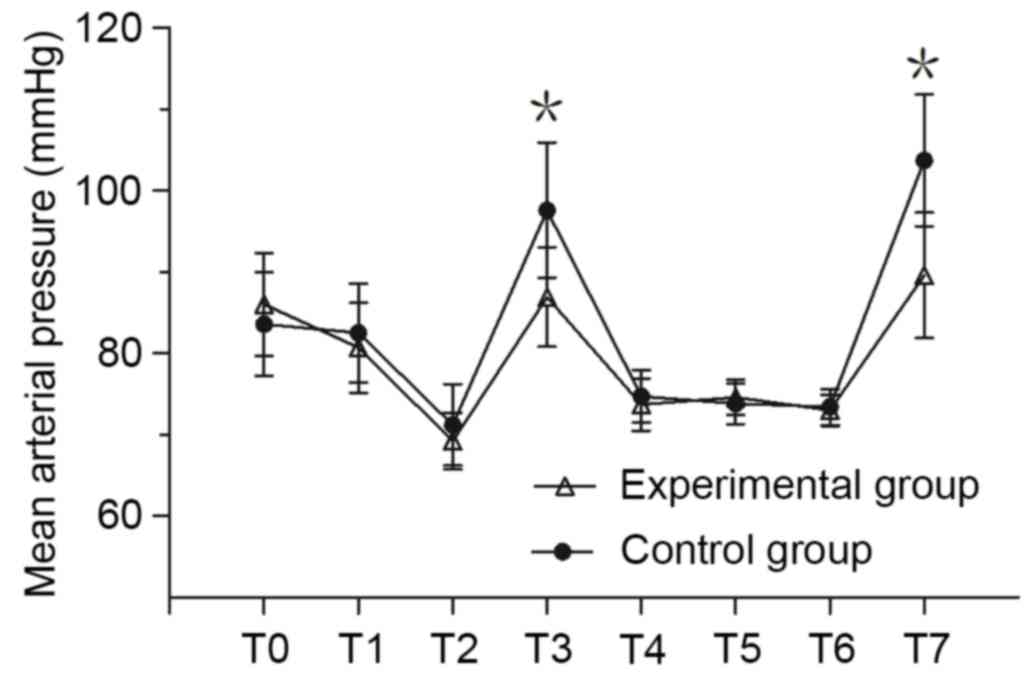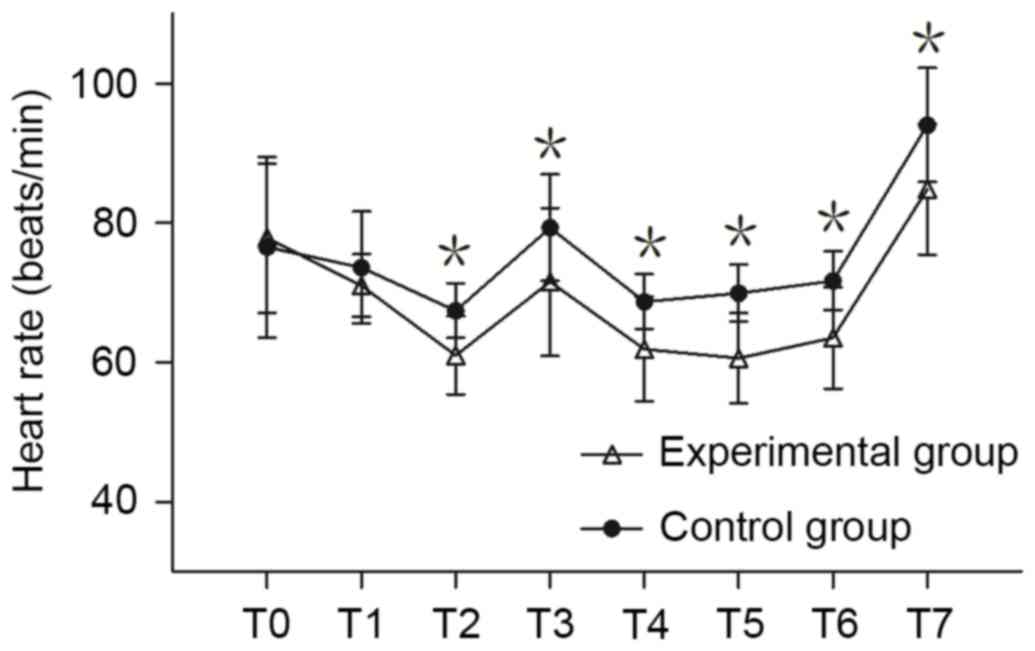|
1
|
Slack R and Bates G: Functional endoscopic
sinus surgery. Am Fam Physician. 58:707–718. 1998.PubMed/NCBI
|
|
2
|
Cinčikas D, Ivaškevičius J, Martinkėnas JL
and Balseris S: A role of anesthesiologist in reducing surgical
bleeding in endoscopic sinus surgery. Medicina (Kaunas).
46:730–734. 2010.PubMed/NCBI
|
|
3
|
Degoute CS: Controlled hypotension: A
guide to drug choice. Drugs. 67:1053–1076. 2007. View Article : Google Scholar : PubMed/NCBI
|
|
4
|
Ge YL, Lv R, Zhou W, Ma XX, Zhong TD and
Duan ML: Brain damage following severe acute normovolemic
hemodilution in combination with controlled hypotension in rats.
Acta Anaesthesiol Scand. 51:1331–1337. 2007. View Article : Google Scholar : PubMed/NCBI
|
|
5
|
Amorocho MR and Sordillo A: Anesthesia for
functional endoscopic sinus surgery: A review. Anesthesiol Clin.
28:497–504. 2010. View Article : Google Scholar : PubMed/NCBI
|
|
6
|
Tirelli G, Bigarini S, Russolo M,
Lucangelo U and Gullo A: Total intravenous anaesthesia in
endoscopic sinus-nasal surgery. Acta Otorhinolaryngol Ital.
24:137–144. 2004.PubMed/NCBI
|
|
7
|
Miłoński J, Zielińska-Bliźniewska H,
Golusiński W, Urbaniak J, Sobański R and Olszewski J: Effects of
three different types of anaesthesia on perioperative bleeding
control in functional endoscopic sinus surgery. Eur Arch
Otorhinolaryngol. 270:2045–2050. 2013. View Article : Google Scholar : PubMed/NCBI
|
|
8
|
Marzban S, Haddadi S, Nia Mahmoudi H,
Heidarzadeh A, Nemati S and Nabi Naderi B: Comparison of surgical
conditions during propofol or isoflurane anesthesia for endoscopic
sinus surgery. Anesth Pain Med. 3:234–238. 2013. View Article : Google Scholar : PubMed/NCBI
|
|
9
|
Gerlach AT and Dasta JF: Dexmedetomidine:
An updated review. Ann Pharmacother. 41:245–252. 2007. View Article : Google Scholar : PubMed/NCBI
|
|
10
|
Kim H, Ha SH, Kim CH, Lee SH and Choi SH:
Efficacy of intraoperative dexmedetomidine infusion on
visualization of the surgical field in endoscopic sinus surgery.
Korean J Anesthesiol. 68:449–454. 2015. View Article : Google Scholar : PubMed/NCBI
|
|
11
|
Lee J, Kim Y, Park C, Jeon Y, Kim D, Joo J
and Kang H: Comparison between dexmedetomidine and remifentanil for
controlled hypotension and recovery in endoscopic sinus surgery.
Ann Otol Rhinol Laryngol. 122:421–426. 2013. View Article : Google Scholar : PubMed/NCBI
|
|
12
|
Yeganeh N, Roshani B, Latifi H and Almasi
A: Comparison of target-controlled infusion of sufentanil and
remifentanil in blunting hemodynamic response to tracheal
intubation. J Inj Violence Res. 5:101–107. 2013. View Article : Google Scholar : PubMed/NCBI
|
|
13
|
Hall DL, Weaver J, Ganzberg S, Rashid R
and Wilson S: Bispectral EEG index monitoring of high-dose nitrous
oxide and low-dose sevoflurane sedation. Anesth Prog. 49:56–62.
2002.PubMed/NCBI
|
|
14
|
Boezaart AP, van der Merwe J and Coetzee
A: Comparison of sodium nitroprusside- and esmolol-induced
controlled hypotension for functional endoscopic sinus surgery. Can
J Anaesth. 42:373–376. 1995. View Article : Google Scholar : PubMed/NCBI
|
|
15
|
Crawley BK, Barkdull GC, Dent S, Bishop M
and Davidson TM: Relative hypotension and image guidance: Tools for
training in sinus surgery. Arch Otolaryngol Head Neck Surg.
135:994–999. 2009. View Article : Google Scholar : PubMed/NCBI
|
|
16
|
Cardesín A, Pontes C, Rosell R, Escamilla
Y, Marco J, Escobar MJ and Bernal-Sprekelsen M: Hypotensive
anaesthesia and bleeding during endoscopic sinus surgery: An
observational study. Eur Arch Otorhinolaryngol. 271:1505–1511.
2014. View Article : Google Scholar : PubMed/NCBI
|
|
17
|
Jacobi KE, Böhm BE, Rickauer AJ, Jacobi C
and Hemmerling TM: Moderate controlled hypotension with sodium
nitroprusside does not improve surgical conditions or decrease
blood loss in endoscopic sinus surgery. J Clin Anesth. 12:202–207.
2000. View Article : Google Scholar : PubMed/NCBI
|
|
18
|
Srivastava U, Dupargude AB, Kumar D, Joshi
K and Gupta A: Controlled hypotension for functional endoscopic
sinus surgery: Comparison of esmolol and nitroglycerine. Indian J
Otolaryngol Head Neck Surg. 65:440–444. 2013. View Article : Google Scholar : PubMed/NCBI
|
|
19
|
Wormald PJ, Athanasiadis T, Rees G and
Robinson S: An evaluation of effect of pterygopalatine fossa
injection with local anesthetic and adrenalin in the control of
nasal bleeding during endoscopic sinus surgery. Am J Rhinol.
19:288–292. 2005.PubMed/NCBI
|
|
20
|
Nair S, Collins M, Hung P, Rees G, Close D
and Wormald PJ: The effect of beta-blocker premedication on the
surgical field during endoscopic sinus surgery. Laryngoscope.
114:1042–1046. 2004. View Article : Google Scholar : PubMed/NCBI
|
|
21
|
Eberhart LH, Folz BJ, Wulf H and Geldner
G: Intravenous anesthesia provides optimal surgical conditions
during microscopic and endoscopic sinus surgery. Laryngoscope.
113:1369–1373. 2003. View Article : Google Scholar : PubMed/NCBI
|
|
22
|
Wormald PJ, van Renen G, Perks J, Jones JA
and Langton-Hewer CD: The effect of the total intravenous
anesthesia compared with inhalational anesthesia on the surgical
field during endoscopic sinus surgery. Am J Rhinol. 19:514–520.
2005.PubMed/NCBI
|
|
23
|
Toivonen J, Virtanen H and Kaukinen S:
Deliberate hypotension induced by labetalol with halothane,
enflurane or isoflurane for middle-ear surgery. Acta Anaesthesiol
Scand. 33:283–289. 1989. View Article : Google Scholar : PubMed/NCBI
|
|
24
|
Snidvongs K, Tingthanathikul W,
Aeumjaturapat S and Chusakul S: Dexmedetomidine improves the
quality of the operative field for functional endoscopic sinus
surgery: Systematic review. J Laryngol Otol. 129:S8–13. 2015.
View Article : Google Scholar : PubMed/NCBI
|
|
25
|
Ragab SM and Hassanin MZ: Optimizing the
surgical field in pediatric functional endoscopic sinus surgery: A
new evidence-based approach. Otolaryngol Head Neck Surg. 142:48–54.
2010. View Article : Google Scholar : PubMed/NCBI
|
|
26
|
Shams T, El Bahnasawe NS, Abu-Samra M and
El-Masry R: Induced hypotension for functional endoscopic sinus
surgery: A comparative study of dexmedetomidine versus esmolol.
Saudi J Anaesth. 7:175–180. 2013. View Article : Google Scholar : PubMed/NCBI
|
|
27
|
Talke P, Lobo E and Brown R: Systemically
administered alpha2-agonist-induced peripheral vasoconstriction in
humans. Anesthesiology. 99:65–70. 2003. View Article : Google Scholar : PubMed/NCBI
|
|
28
|
Larsen R and Kleinschmidt S: Controlled
hypotension. Anaesthesist. 44:291–308. 1995. View Article : Google Scholar : PubMed/NCBI
|
|
29
|
Sieśkiewicz A, Drozdowski A and Rogowski
M: The assessment of correlation between mean arterial pressure and
intraoperative bleeding during endoscopic sinus surgery in patients
with low heart rate. Otolaryngol Pol. 64:225–228. 2010. View Article : Google Scholar : PubMed/NCBI
|
|
30
|
Monk TG, Saini V, Weldon BC and Sigl JC:
Anesthetic management and one-year mortality after noncardiac
surgery. Anesth Analg. 100:4–10. 2005. View Article : Google Scholar : PubMed/NCBI
|
|
31
|
Arcangeli A, D'Alò C and Gaspari R:
Dexmedetomidine use in general anaesthesia. Curr Drug Targets.
10:687–695. 2009. View Article : Google Scholar : PubMed/NCBI
|
|
32
|
Gunalan S, Venkatraman R, Sivarajan G and
Sunder P: Comparative evaluation of bolus administration of
dexmedetomidine and fentanyl for stress attenuation during
laryngoscopy and endotracheal intubation. J Clin Diagn Res.
9:UC06–UC09. 2015.PubMed/NCBI
|
|
33
|
Fan Q, Hu C, Ye M and Shen X:
Dexmedetomidine for tracheal extubation in deeply anesthetized
adult patients after otologic surgery: A comparison with
remifentanil. BMC Anesthesiol. 15:1062015. View Article : Google Scholar : PubMed/NCBI
|
|
34
|
Guven DG, Demiraran Y, Sezen G, Kepek O
and Iskender A: Evaluation of outcomes in patients given
dexmedetomidine in functional endoscopic sinus surgery. Ann Otol
Rhinol Laryngol. 120:586–592. 2011. View Article : Google Scholar : PubMed/NCBI
|
















